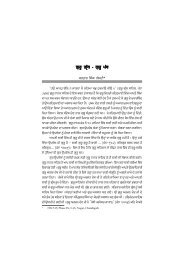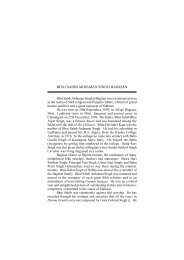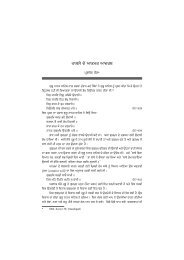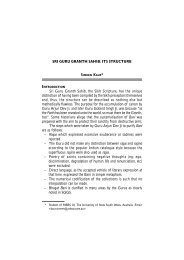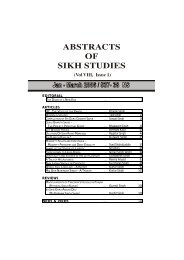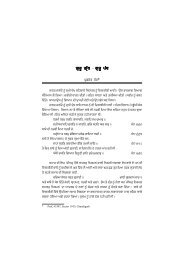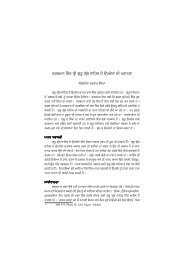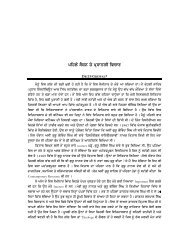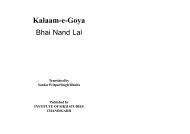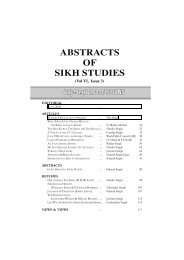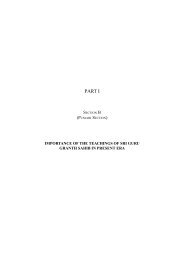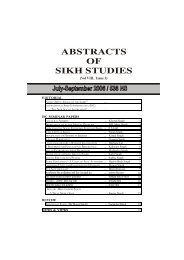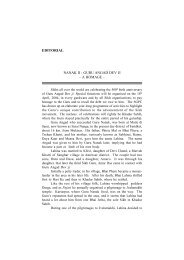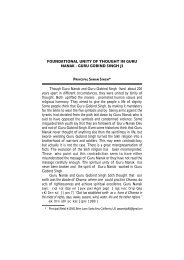editorial articles reviews news & views - Institute of Sikh Studies
editorial articles reviews news & views - Institute of Sikh Studies
editorial articles reviews news & views - Institute of Sikh Studies
You also want an ePaper? Increase the reach of your titles
YUMPU automatically turns print PDFs into web optimized ePapers that Google loves.
MCLEOD & FENECH AS SCHOLARS ON SIKHISM AND MARTYRDOM<br />
81<br />
words have same dictionary meaning. His bringing in Bhai Gurdas,<br />
and Guru Nanak’s advocacy <strong>of</strong> living a life “with honour, justice and<br />
self-respect”, do not mean anything different.<br />
He concedes that the successors <strong>of</strong> Guru Nanak, viz., Guru<br />
Angad (including Bhai Gurdas, or Dabistan-i-Mazahib) to Guru Gobind<br />
Singh reflect “the same courage, defiance and fearlessness.” He gives<br />
political meaning to the institution <strong>of</strong> ‘masand’, which could as well<br />
be against Brahminism (which he does not specify because <strong>of</strong> special<br />
relationship in 1984) as against the local administration.<br />
Fenech now comes to the fifth Guru who is the first martyr and<br />
raises the impertinent question, Why did he agree to undergo<br />
martyrdom Why not Guru Nanak or his three successors He again<br />
quotes “tradition” and “the vast majority <strong>of</strong> their texts” which could<br />
very well mean the Mina tradition that was available only to Guru<br />
Arjun, Niranjarias or Brahminic infiltrators’ tradition, or even McLeod<br />
and his collaborator’s tradition. Also involved in the process was the<br />
basic issue, what constituted the basic essentials <strong>of</strong> <strong>Sikh</strong>ism under<br />
Guru Nanak and his successors. Akbar dealt with Brahmins’ false<br />
charges directly.<br />
Fenech talks <strong>of</strong> “a tolerant emperor, Jahangir” that could be<br />
possibly true <strong>of</strong> Jahangir’s later administration, but not the early years.<br />
He also talks <strong>of</strong> Chandu Shah, Prithi Chand and Shaikh Ahmad<br />
Sirhindi, but completely avoids Brahmins as a factor, or Dr. Ganda<br />
Singh’s research into Guru Arjun’s martyrdom, conducted much before<br />
Fenech or his rnentor McLeod conducted research. Again, Fenech does<br />
not talk <strong>of</strong> Tuzak-i-Jahangiri, definite historical work, but only ‘tradition’<br />
which gives him much leeway.<br />
Wherefrom he got ‘tradition’, making Emperor Jahangir to<br />
“include within the sacred <strong>Sikh</strong> scripture hymns in honour <strong>of</strong> Prophet<br />
Muhammad,” especially in violation <strong>of</strong> what he wrote in Tuzak-i-<br />
Jahangiri, or the “scorching heat <strong>of</strong> July” in place <strong>of</strong> May for Guru<br />
Arjun’s martyrdom, one is bewildered to know. Here he quotes<br />
‘tradition’ four-five times in a couple <strong>of</strong> pages, and says that the Guru<br />
finally “died” in River Ravi, without using the word ‘martyred’ or<br />
‘martyrdom’, he had used earlier.



